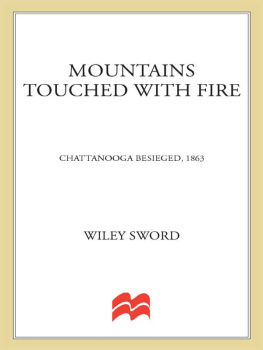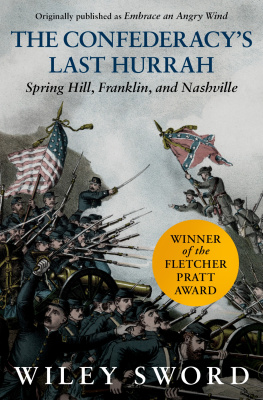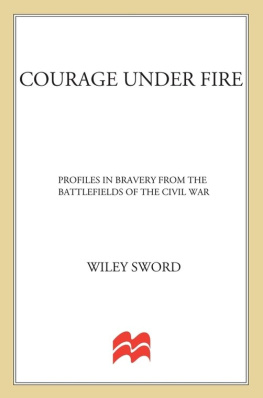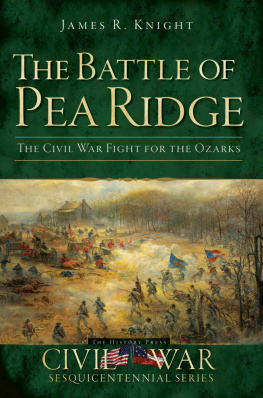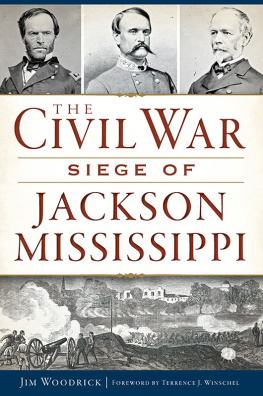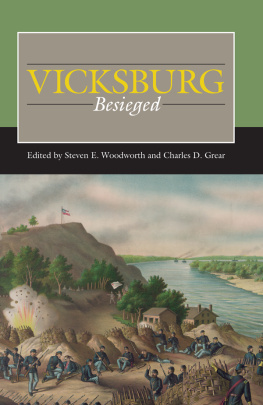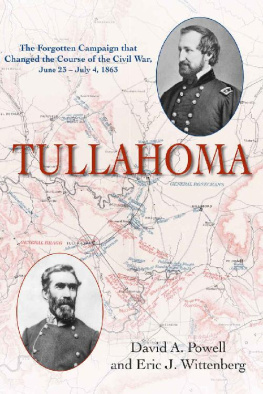M RS . G ENEVIEVE J OHNSON S WORD
Foreword
For the North, the summer of 1863 marked the end of the beginning of the Civil War; for the South, the beginning of the end. On July 3, at Gettysburg, Pennsylvania, the Union Army of the Potomac won, insofar as actual fighting was concerned, its first major victory, in the process turning back Robert E. Lees second attempt to carry the war into the North and inflicting on his forces casualties from which they never recovered, with the result that henceforth the Confederacy would be on the strategic defensive, seeking to hold the Yankees at bay in Virginia. A day later, July 4, Ulysses S. Grant captured Vicksburg, the Souths last great stronghold on the Mississippi River: Not only was the Confederacy now cut in twain physically and psychologically, but more importantly the North had achieved an unchallengeable dominance of the Mississippi Valley and thus was in a position to penetrate the lower South on either side of the mighty Father of Waters as it, in Abraham Lincolns words, flowed unvexed to the sea.
Finally, in middle Tennessee, the third main theater of military operations, Northern power likewise asserted itself against Southern weakness. Starting out from Murfreesboro in late June, Maj. Gen. William S. Rosecranss Army of the Cumberland, in a series of brilliant maneuvers, compelled General Braxton Braggs Army of Tennessee to evacuate Chattanooga early in September and retreat into Georgia, closely pursued. For the Confederacy, this was a disaster both actually and potentially worse than those it had suffered at Gettysburg and Vicksburg. The former, after all, merely represented a failure to carry out a successful invasion of the North and the Yankees had made no serious effort to exploit their hard-won victory in Pennsylvania by launching another On to Richmond offensive in Virginia. When they did, Lee could be counted on to deal with them as he had in the past. Similarly, Grant had made no attempt to follow up his capture of Vicksburg and showed no sign of so doing in the near future. Besides, since the Confederates utterly lacked the means to recapture Vicksburg, it was pointless for them even to think about itand they did not.
The loss of Chattanooga was different. It meant the loss of Tennessee and threatened the loss of Georgia. Together these states constituted the heartland of the Confederacy. Without them, victory would be impossible and defeat certain. Something, therefore, had to be done to retrieve Chattanooga. Moreover, thanks to the enemys inactivity in Virginia, something could be done.
And it was. The Confederate government sent by railroad Lt. Gen. James Longstreet and two divisions of Lees army from Virginia to Georgia. There, on September 1920, along the banks of Chickamauga Creek, they joined Braggs troops in assailing Rosecranss Army of the Cumberland. Through a combination of good luck, a bad Yankee blunder, and, above all, hard and bloody fighting, the Confederates drove the Federals from the field, inflicting on them heavy casualties.
That, though, is all they did. The Army of the Cumberland, with Maj. Gen. George H. Thomas replacing Rosecrans as commander, still held Chattanooga, the gateway to Georgia, and was determined to keep holding it despite an increasingly precarious supply situation. On the other hand, the Confederates had suffered such heavy losses in winningnearly one third of their total combat strengththat they dared not attack the strongly fortified enemy and so besieged Chattanooga in hope of starving the Yankees into retreating or surrendering. In sum, while tactically the Battle of Chickamauga had been a Southern victory, strategically it settled nothing. Only by taking Chattanooga and either destroying the Army of the Cumberland or forcing it to seek survival in flight could the Confederates assure the safety of Georgia and redeem Tennessee. By the same token, only by breaking out of Chattanooga and defeating Braggs army could the Federals secure their control of Tennessee and resume their march into Georgia.
The story of how and why the Federals succeeded and the Confederates failed to do what each respectively had to do is a dramatic one, dramatically told in the pages of this book. It also is a story filled with paradoxes, ironies, and strange, even bizarre happenings. Thus, to give just a few examples, the reader will read about the following:
A commander who is more interested in battling with his own generals than he is the enemys army, with the result that although he defeats his generals, he in turn is defeated by the enemy.
Another commander whose plan for winning the battle fails in all key respects, yet who wins the battle and claims that it was won exactly as he planned.
A general famous for his speed and aggressiveness who is so slow and cautious that he is defeated by a far smaller force headed by a former private. Adding paradox to paradox and irony to irony, had this general been slower and more cautious, he would have gained an easy victory.
Troops who, after being ordered by their commander not to attack because he deems them unfit for offensive operations, disregard that order and execute the most successful frontal assault of the Civil War.
Other troops, veterans who always have fought with almost incredible bravery, who flee in panic from a position that should have been impregnablewhich is one of the reasons they flee, for neither they nor their generals thought that the enemy would be so foolhardy as to attack that position.
Now, reader, having done my best to encourage you to do what presumably you intend to do anywayread this bookI turn you over to the author, Mr. Wiley Sword. That, incidentally, is his actual name, notwithstanding it being so singularly and suspiciously apt for a writer of military history. Moreover, as you will soon discover, he is a sword who wields a wily pen. So enjoy, and as you enjoy, learn about one of the truly decisive events of the Civil War: the Siege and Battle of Chattanooga.
Albert Castel,
author of Decision in the West:
The Atlanta Campaign of 1864
Acknowledgments
For the generous cooperation of the following individuals and institutions, I am particularly grateful.
Dr. Albert Castel, Hillsdale, Michigan, read the manuscript and provided valuable suggestions and materials. His keen insight and vast knowledge is reflected in the foreword.
Zack Waters, Rome, Georgia, was especially helpful with the procurement of rare and hard-to-locate Confederate accounts, even copying by hand a lengthy personalized description.
Greg Beck, Livonia, Michigan, made available dozens of regimental histories from the extensive collection of the late Mil Lent.
Bill Mason, Morehead City, North Carolina, provided many books and several indexes.
James Ogden III, Historian at the Chickamauga-Chattanooga National Military Park, Ft. Oglethorpe, Georgia, helped with technical details and provided a variety of information pertaining to Confederate artillery units.

